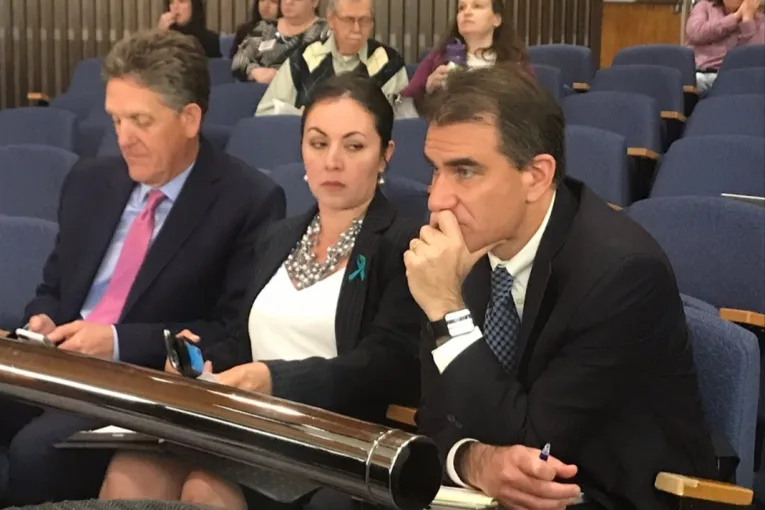

She was just a teenager. Her testimony threatened to topple the careers of police officers and high-ranking public officials across the San Francisco Bay Area. The explosive case—one of Northern California’s most sordid sex scandals—involved the police officers who exploited her, and those who investigated them.
As investigations spread across five law enforcement agencies and three counties, the young woman—a central witness—was abruptly shipped off to a sketchy rehabilitation facility on the East Coast. Police called it a “paid vacation”. Her attorneys called it witness tampering and obstruction of justice.
For years, the truth behind who coordinated and paid for her police-sponsored vacation remained a mystery that no one, including the media, was able to solve. Then came a new police transparency law and a bitter divorce case involving a high-ranking official in the Santa Clara County District Attorney’s Victim Services Unit, uncovering a decade-long sophisticated cover-up in the Bay Area police misconduct scandal.
After a five-year investigation, Vanguard News Group can now reveal that the Florida relocation—described in a 2017 civil rights lawsuit as a conspiracy to obstruct justice through witness tampering—was outsourced to the controversial Santa Clara County District Attorneys Office.
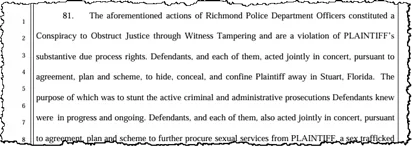
A Suicide Note and Police Dispatcher’s Daughter
Celeste Guap is the pseudonym used by Jasmine Abuslin, a young woman at the center of a major police misconduct scandal in the San Francisco Bay Area. A scandal first revealed in a police officer’s suicide note, followed by countless lawsuits and media headlines.
In September 2015, Oakland Police Officer Brendan O’ Brien committed suicide in the same apartment where his wife had died a year earlier. For a time O’Brien was a suspect in his wife’s death.
In the note O’Brien left behind, he described the decline of his mental health and struggles with alcohol. He also described that a police dispatcher’s daughter was threatening to expose a sexual relationship he had with her when she was a minor. O’Brien described connecting with Celeste Guap on Facebook as the “worst decision of his life.”
In closing his letter, O’Brien warned his colleagues who might later investigate to consider anything Celeste Guap might tell them, would be “a lie.”
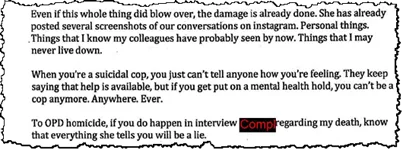
Cover- Up Begins: Internal Affairs Interview
Days after O’ Brien’s death, as she turned eighteen, Guap told investigators Oakland police officers sexually exploited her. In the 2015 interview, Guap named police officers, read social media posts and text messages, and actively deleted evidence in the presence of police investigators.
The police interview would later be described in a court ordered report as “wholly inadequate.” Specifically, noting investigators treated Guap with hostility, they seemingly tried to blame her for O’ Brien’s death, claimed she could be responsible for more officers self-harming, and allowing her to delete evidence in their presence.
Sex Scandal Buried in Confidential Police Records
At the time the Guap sex scandal was being investigated, the Oakland Police Department was under a federal consent decree. The case was overseen by U.S. District Judge Thelton Henderson.
According to sources familiar with the case, Judge Henderson grew frustrated with Oakland Police Chief Sean Whent and lack of settlement compliance by department officials who had agreed to the consent decree terms over a decade earlier.
By March 2016, Judge Henderson appointed the Swanson and McNamara law firm to investigate and report on the Oakland Police Department’s handling of Guap’s claims.
In May 2016, Guap began speaking to local reporters. The story that had remained concealed in police departments throughout the San Francisco Bay Area was picked up by local and national news outlets.

Oakland Police Tracked Media Coverage in the Celeste Guap Police Sex Scandal
Young Woman the Media Believed
As Guap hurled police officer names into the press, high ranking police chiefs, including Oakland Police Chief Sean Whent, began to resign. Nearly thirty police officers were implicated in the scandal.
Then, as Alameda County District Attorney Nancy O’Malley contemplated criminal charges against Oakland police officers, Guap disclosed to reporters that she planned to accept an offer from Richmond Police to attend rehab for her “drug and sex addictions.”
Guap told reporters she would be going to rehab in Florida, and Richmond police were paying for her trip. A trip she was told to consider a “paid vacation.”
On August 26, 2016, a Richmond police officer drove Guap to San Francisco International Airport, where she boarded a Virgin America flight to Fort Lauderdale. Hours later she was admitted to the Treasure Coast Recovery Center in Stuart, Florida.
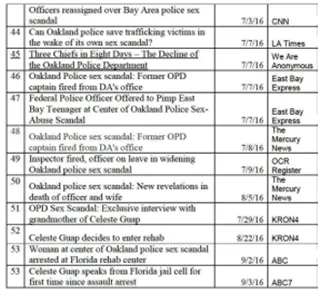
Victim Witness Arrested in Florida
Three days after her arrival in Florida, Guap was arrested for felony aggravated battery following an altercation with a rehab staff member. She was assigned a public defender. As she sat in a Martin County Floria jail, her bail was set at $300,000.
Journalists in California recognized Guap’s real name in Florida news coverage and began reporting on her arrest. Shortly thereafter, civil rights attorneys, Charles Bonner and Pamela Price, traveled to Florida to assist Guap in securing private defense counsel.
Assistant State Attorney David Lustgarten prosecuted the case in Florida, reducing the charges against Guap to misdemeanor battery. Guap accepted a plea deal, served 17 days in jail, wrote an apology letter to the victim, and was released for time served.

California Attorney General Kamala Harris Declines to Investigate
The decision by Richmond Police to relocate Guap to Florida during ongoing criminal and administrative investigations—particularly against Oakland Police, who were already under a federal consent decree—sparked significant controversy.
Media outlets including KQED, The Los Angeles Times, East Bay Express, and Mother Jones reported extensively on the scandal.
After Gaup returned to California, Contra Costa Supervisor John Gioia, whose district includes the City of Richmond, published an op-ed in the East Bay Times urging independent investigations by then-California Attorney General Kamala Harris.
Harris declined to take over the case.
That same month, Guap filed a $66 million claim against the City of Oakland through her attorneys. A claim later settled out of court for less than $1 million.
Contra Costa District Attorney Source of Misinformation
Two months later, in November 2016, Contra Costa District Attorney Mark Peterson issued a press release stating that Guap had changed her mind about treatment in Florida. He added, “No District Attorney’s Office had ever lodged a protest with our office objecting to Guap’s travel to Florida.”
Peterson stated, “To our knowledge, the VCB paid for Ms. Abuslin’s travel expenses.”
Specifically, Peterson wrote, “ Due to Ms. Abuslin’s ongoing privacy rights, we are limited as to what we can reveal concerning her travel to Florida, however, it’s abundantly clear that there was no scheme by any police agency nor by any other organization to secrete Ms. Abuslin out of California in order to hinder any local investigation or prosecution.”
Mark Peterson never mentioned Santa Clara County in his 2016 press release.
Nearly a year later, Peterson was criminally charged for misuse of funds in connection with his political campaign. He took a plea deal, resigned from the Contra Costa District Attorney’s Office and was subsequently disbarred.
In 2017, Contra Costa Supervisors selected Diane Becton to replace Peterson as Contra Costa’s District Attorney.
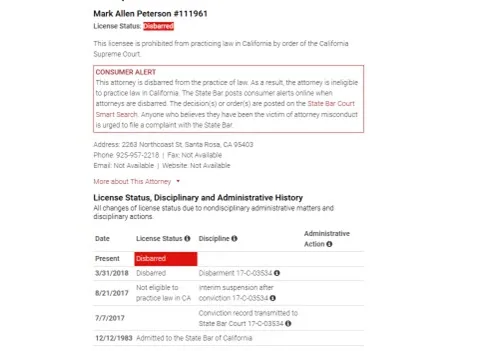
Witness Tampering Protects Police at Center of Sex Exploitation Scandal
Shortly after Guap fired Pamela Price from her legal team, John Burris and Charles Bonner filed a federal lawsuit against Richmond Police Department on Guap’s behalf. The lawsuit alleged Richmond police officers knew that Guap’s testimony could result in criminal and civil prosecutions as well as departmental discipline of officers.
As the federal lawsuit points out, Richmond police allegedly conspired to keep Guap from testifying by sending her to be institutionalized in a rehabilitation facility in Stuart Florida.
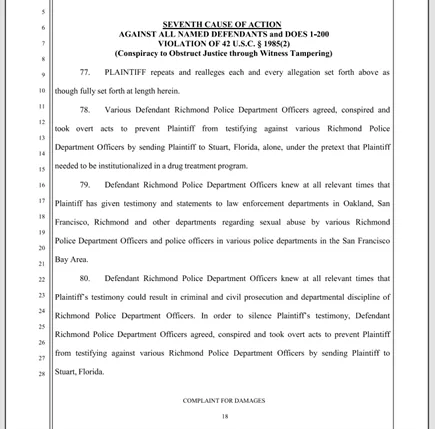
In June 2017 the Swanson – Barron Report Judge Henderson ordered in the federal receivership case was published. The report was silent on the 2016 relocation of Guap out of state, as well as the involvement of employees from the Santa Clara County District Attorney’s Office.
It would not be until 2019 that a new California police transparency law would produce records linking Santa Clara County District Attorney Jeff Rosen’s Victim Services Unit employees to the scandal and sophisticated coverup.
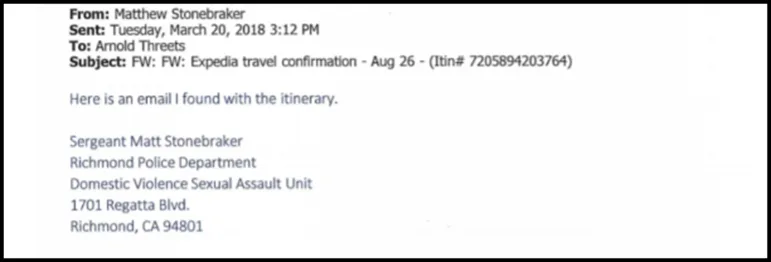

California’s Transparency Law Exposes Silicon Valley Role in the Cover Up
In 2019, a bill championed by State Assembly Member Nancy Skinner, California’s SB 1421, went into effect, giving public access to police misconduct records previously concealed in police department personnel files and internal investigations.
The records revealed Richmond Police Department’s Domestic Violence and Sexual Assault Unit, Sergeant Matthew Stonebraker, and Contra Costa Victim Services employee Shannon Mahoney, coordinated with Santa Clara County Victim Services Director Kasey Halcon and victim claims staffers Saher Stephan and Nida Rehman to coordinate and pay for Guap to be sent to the Treasure Coast Recovery Center in Stuart Florida in August 2016.
The scheme was further concealed from the public based on omissions in Contra Costa District Attorney Mark Peterson’s 2016 press release, the Swanson – Barron 2017 report issued in the federal receivership case, the internal affairs report published by Oakland Police, and by the silence of Santa Clara District Attorney, Jeff Rosen.
Records released in 2019 confirm Santa Clara County employees Kasey Halcon, Saher Stephan and Nida Rehman coordinated the trip and rehab facility payment Richmond police officers told Guap to consider a “free vacation”.
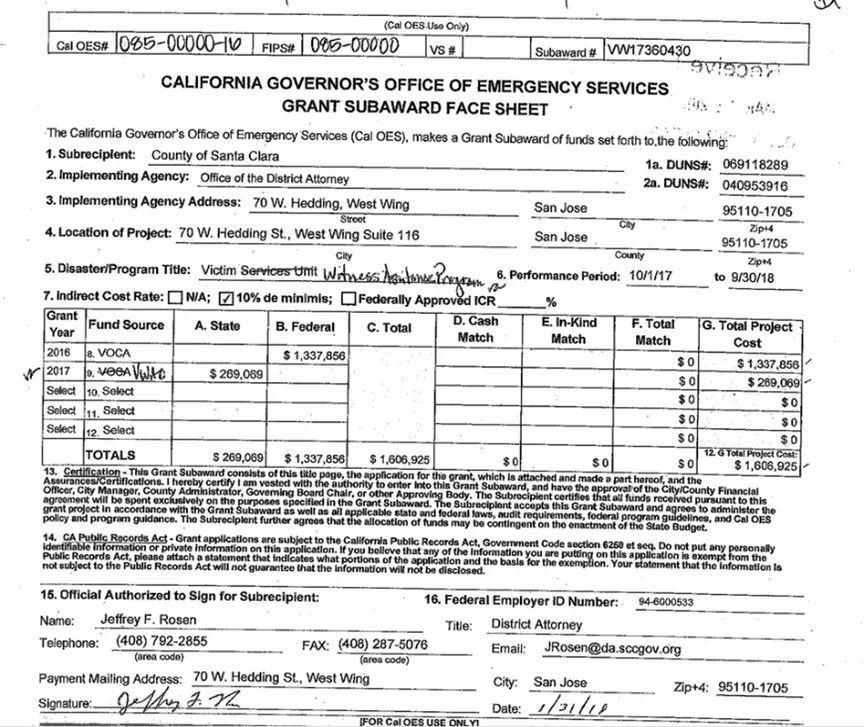
Sexual Relationships in the DA’s Office Leads to Two Divorce Cases
Santa Clara County District Attorney Jeff Rosen selected Kasey Halcon and Saher Stephan to lead the county’s Victim Services Unit when it was moved under the district attorney’s management in 2015.
As Halcon, Stephan and Rehman assisted in coordinating Guap’s relocation to Florida in 2016, the Santa Clara County Victim Services Unit took in $1,337,856 in federal funding. That same year, Kasey Halcon earned $117,423 in pay and benefits. Santa Clara County Supervisors had appointed Halcon to the county’s Domestic Violence Council where she remained until 2022.
In 2022, Halcon was promoted to the county’s executive offices where she now earns more than $365,759 in pay and benefits each year. A $250,000 pay increase over what she earned while coordinating Gaup’s move to Florida in 2016.
Most disturbing, as they arranged to ship Celeste Guap 3000 miles away, Saher Stephan and Rehman were engaged in an extramarital affair. An affair that led to their respective divorces after a private investigator captured the couple’s intimate exchanges on camera.

During his divorce, Saher Stephan was represented by divorce attorney Walter Hammon. His former wife involuntarily represented herself. Court documents and testimony in family court show Stephan’s former wife struggled to obtain records and information about her husband’s income and employment status in the district attorney’s office.
Further, she alleged Stephan used a community credit card to pay expenses incurred on the DA’s behalf. Including payment for Celeste Guap’s 2016 trip to Florida and FBI training in Texas he allegedly attended with his office lover.
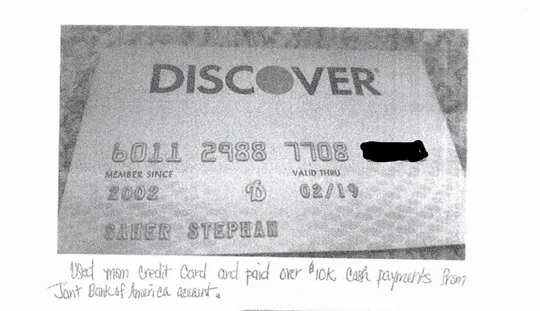
Claims suggest a payment policy in the DA’s office to avoid detection of a financial transactions that would typically be submitted through California’s Victim Compensation Board, (CalVCB). A state fund that provides payment for services crime victims in need.

Before Santa Clara County hired him to process victim financial claims with the state, Saher Stephan had filed for bankruptcy, twice. Nonetheless, he was hired by Santa Clara County DA Jeff Rosen and given access to processing financial payments for crime victims.
During his divorce, Saher Stephan filed for bankruptcy. Once again, claiming he had no assets. His unpaid credit card balances were discharged through the bankruptcy process.
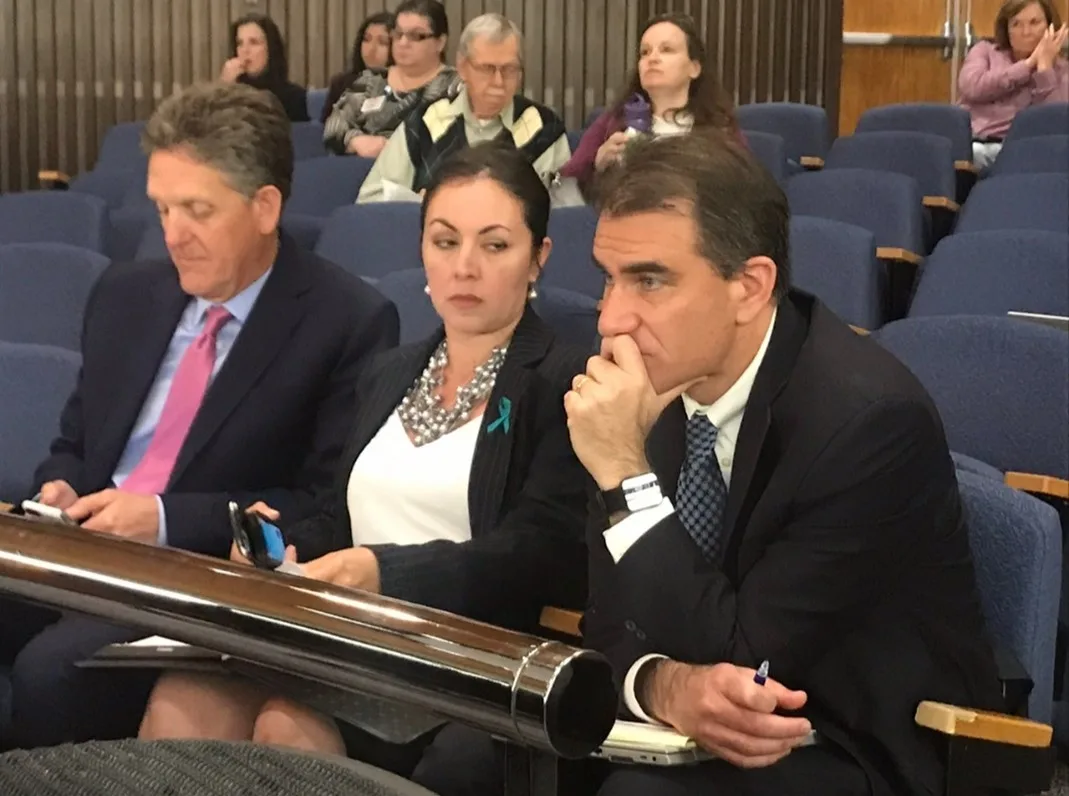
Politics and Profit in Crime Victims
Santa Clara County residents have expressed concerns about mismanagement of the county’s Victim Services Unit since its transfer to the District Attorney’s oversight. Complaints include reports of the office’s failure to process crime victim claim applications as well as noncompliance with state crime victim laws.
Recently, families of murder victims from the 1988 ESL mass shooting voiced frustration after the District Attorney’s Victim Services Unit failed to notify them of DA Jeff Rosen’s intent to seek a reversal of Richard Farley’s death penalty conviction.
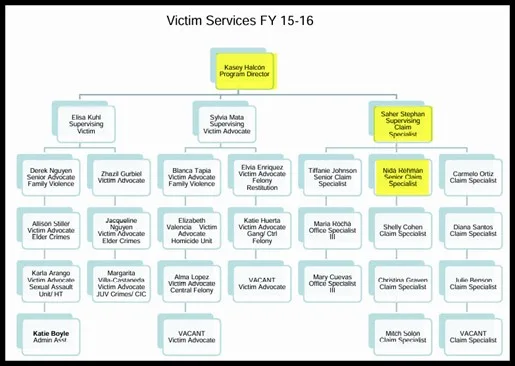
Cover-Up Bounces Around DA Offices
Records released under California Senate Bill 1421 reveal that in 2018, three months after Guap dismissed a federal lawsuit against the Richmond police department, Richmond Police Captain Arnold Threets was informed of Santa Clara County’s involvement in the Guap case.
Three years later, DA Becton appointed Threets to lead Contra Costa County District Attorney Investigators. That same year, California Governor Gavin Newsom appointed DA Becton to the state’s Victim Compensation Board (CalVCB).
Becton said of her appointment, “I am proud to join the Victim Compensation Board to ensure victims of crime and their families are compensated and protected.”
When confronted with documents evidencing Santa Clara County’s District Attorney’s (DA) involvement and dissemination of false information through Peterson’s 2016 press release, DA Becton and Investigator Threets declined to comment.
Martin County Assistant State Attorney David Lustgarten, who prosecuted Guap in Florida in 2016, said, “I have not heard of my office, or victim services with prosecutorial blessing, sending a victim to rehab. Let alone 3,000 miles away. This sounds highly usual to me in my experience.”
Lustgarten has been a prosecutor for 25 years. He graduated from Georgetown Law School in 1994.
New Calls to Investigate
Contra Costa County Supervisor John Gioia, whose district includes the City of Richmond, responded to the newly-discovered records implicating the Santa Clara County District Attorney in the coverup by stating: “In 2016, I publicly called for an independent investigation by California Attorney General Kamala Harris into allegations that 29 law enforcement officers across four counties sexually exploited Celeste Guap, a 19-year-old Richmond resident.”
Gioia added, “The disclosure of newly revealed documents reinforces and validates my original call for a State Attorney General investigation. Such an inquiry is essential to restoring public trust in our justice system and addressing concerns about potential bias from local District Attorney offices, which work closely with local law enforcement.”
Gioia, who has represented the Richmond area as a county supervisor since 1999, underscored the importance of accountability and transparency in resolving this case.
Reporting on the Celeste Guap case and the involvement of the Santa Clara County District Attorney’s Office is ongoing.